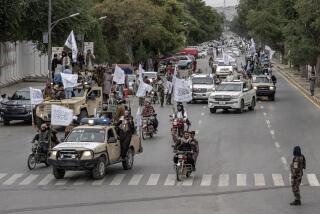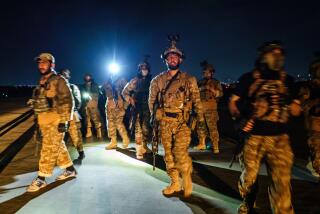Hamid Karzai, his chief rival tied in preliminary tally of Afghanistan vote
KABUL, AFGHANISTAN — What was billed as a pivotal summer for the Western war effort in Afghanistan has become a season of drift and disappointment.
The country’s second direct presidential election -- a vote that was intended to be unifying, even uplifting -- has taken an uncertain and ugly turn.
The first partial results, released Tuesday, were inconclusive but pointed toward the possibility of a divisive runoff between President Hamid Karzai and his chief rival, former Foreign Minister Abdullah Abdullah. Meanwhile, fraud allegations have become more vehement and angry.
A final certified tally is not expected for weeks, and a clouded election result could splinter the country along ethnic lines and usher in a prolonged period of political paralysis just as the West is trying to revive and revamp its war strategy.
Western troop casualties are now at their highest level since the start of the 8-year-old conflict. Roadside bombs and ambushes claim a near-daily toll; four more U.S. troops were killed in a bombing Tuesday.
Thousands of American troops have arrived in the country in recent months, but huge numbers of them are tied down trying to hold and protect tiny slivers of territory in the volatile south.
At the same time, American public support for the Afghanistan mission is faltering, and senior military officials are using some of their bleakest language to date to describe the battlefield impasse.
The Taliban, while failing to deliver on threats to derail last week’s presidential vote, is displaying a growing degree of sophistication and ruthlessness in attacks that kill and maim mainly Afghan civilians. At least 40 people died Tuesday evening when insurgents tried a new tactic in the southern city of Kandahar: stringing together explosives-laden vehicles and setting off five of them in thunderous succession.
Five days after the landmark presidential vote, Afghanistan’s Independent Election Commission -- a body criticized by outside observers for its close ties to incumbent Karzai -- said tallies from 10% of the country’s polling centers suggested that Karzai and his chief rival, Abdullah, are locked in a virtual tie.
The early figures released by election officials gave Karzai 40.6% and Abdullah 38.7% of the vote. Either candidate would need more than 50% to win outright. The more than two dozen other candidates were trailing well behind Karzai and Abdullah.
If the preliminary figures hold up in the final count, a runoff election would be necessary, but it would not be held until October.
“I think tensions will continue to grow while we wait,” said analyst Abdulhadi Hairan of the Center for Conflict and Peace Studies in Kabul, the Afghan capital.
Some officials, including U.S. special regional envoy Richard Holbrooke, cautioned, however, that the tally could still swing widely because several key provinces were not included in the initial results.
Holbrooke, who was in Afghanistan for the vote, warned that the early figures could be “misleading.”
The Obama administration did not support any one candidate, but Karzai’s courting of notorious former warlords -- including Abdul Rashid Dostum, allowed to return from exile days before the election -- was sharply criticized by U.S. and other Western diplomats.
Before the balloting, Western and Afghan officials pointedly avoided setting any benchmark for a turnout that would make the vote appear credible.
But it was clear that Taliban attacks and intimidation, including severing the ink-stained fingers of several voters, had significantly diminished people’s willingness to go out and vote, particularly in the Pashtun heartland of the south, where Karzai’s support is strongest.
Karzai is Pashtun, the largest ethnic group, while Abdullah is mainly identified with the Tajik minority
There has been no official estimate of the turnout, but the preliminary figures suggested that it might have been even lower than initially thought.
Complaints of fraud, meanwhile, continued to pour in. The United Nations-backed Electoral Complaints Commission, which will investigate allegations of irregularities, said it had received more than 800 complaints, about 50 of which had the potential to alter the overall result.
Even before the preliminary tally was released, Abdullah unleashed some of his harshest rhetoric yet against Karzai, accusing the president’s camp of trying to “steal the verdict of the nation.”
The Abdullah campaign released video Tuesday that it said showed Karzai backers and election officials doctoring ballots and intimidating voters.
Karzai’s spokesman, meanwhile, said the government would enforce the law, a veiled warning to Abdullah supporters not to engage in street violence if their candidate lags as the count proceeds.
The growing discord over the election’s outcome threatens to undermine a key element of the Obama administration’s strategy in confronting the insurgency. Western powers hoped a successful election would bolster the central government’s mandate, giving whoever emerged victorious much-needed clout to deal with festering problems such as corruption and the flourishing drug trade.
The darkening political picture comes as Army Gen. Stanley A. McChrystal, the new U.S. commander of Western forces in Afghanistan, prepares to deliver a major assessment of the war’s progress. In advance of that, Adm. Michael G. Mullen, chairman of the Joint Chiefs of Staff, bluntly acknowledged this week that the situation in Afghanistan was “deteriorating.”
The decline in American public support for the war is echoed in countries that are crucial allies in the effort, such as Britain, the largest contributor of troops after the United States.
With the four deaths reported Tuesday, 2009 has so far been the deadliest year for U.S. troops since the war’s outset. July saw more U.S. military deaths in Afghanistan -- 45 -- than any month to date, and the tally of 41 so far in August is approaching that figure.
--
More to Read
Sign up for Essential California
The most important California stories and recommendations in your inbox every morning.
You may occasionally receive promotional content from the Los Angeles Times.










